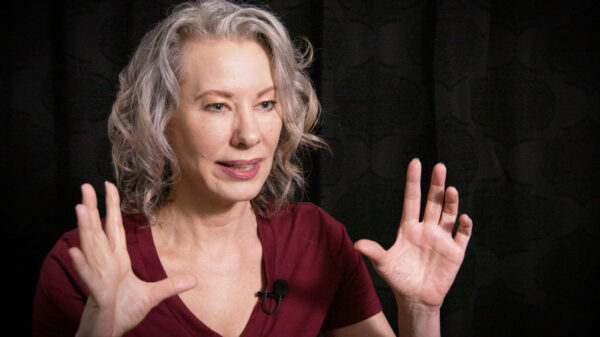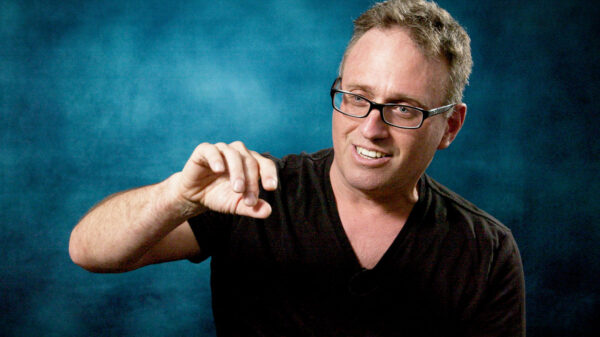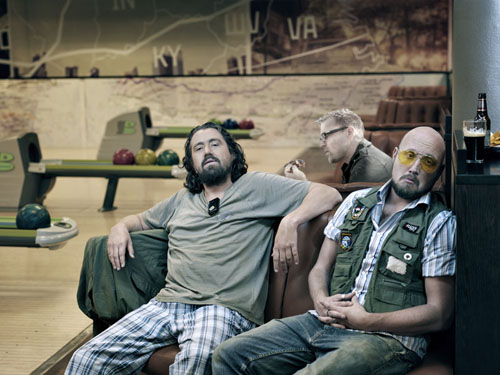
ERIK EGER, MAGNUS OLIV & JOACIM STARANDER – FILMMAKERS
This weekend One Hundred Years Of Evil premieres at indieScreen in New York City. The Swedish born filmmakers Erik Eger, Magnus Oliv and Joacim Starander remember what they have been trying to forget – how their indie production went on for 100 months and almost made them lose their minds.
It’s the spring of 2010. We have been awake for 72 hours and are shooting the last scene before the final wrap. Like countless times before during the production, we’re shooting guerilla style. But this time we’re outside a major airport. In a beaten up van. With a sixteen inch zoom lens sticking out the back window.
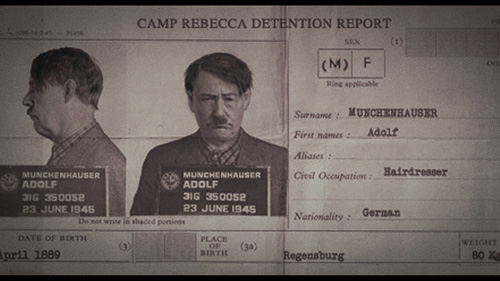
Without our knowledge, the focus puller has bought a laser distance measurer.While getting ready to shoot, she is trying it out to get focus on the two actors inside the airport. As travelers inside see red dots appear around them (and as we should have expected), they panic. In the rearview mirror Erik sees a man with a security badge running towards our van. He is reaching for his gun. Erik throws himself into the driver’s seat and turns the ignition key. Now there’s a hoard of security personnel running towards the van from every direction. We speed into a garage in an attempt to shake any followers, park the car behind a cement wall and sit in silence. Does anybody hear sirens?
Rewind.
It’s 2004 and we have a bunch of ideas for our first feature film. Adolf Hitler surviving WWII as Adolf Munchenhauser is the craziest. And it sticks.
We call the project One Hundred Years of Evil, a fiction film disguised as a documentary in line with Woody Allen’s Zelig and Orson Wells’ F for Fake. We continue working on the script and create our main character: the Norwegian university professor Skule Antonsen, an expert in human lying patterns. He becomes the film’s vertiginous driving force, obsessed with uncovering the truth along with documentary filmmaker Idelfonso Elizalde and his friend Javier Vargas, the sound technician.
Our composer Joacim Starander reads the script and tells us “This is the one. We have to do it, whatever it takes.” We agree. Out of our small office in Gothenburg we sell everything from our furniture down to the yellow post-its on eBay. DP Julian Elizalde comes onboard and then we find actor Jon Rekdal – our Skule Antonsen. We are a team. We are dedicated. This will work. New York City here we come!
We get lucky and rent a 1,000 square foot space in Williamsburg for a decent price. There are no windows, but it doesn´t matter. Seven people sleeping on the floor is OK. One small problem though, we have to make 300 casting callbacks and there is zero cell phone service inside. The only place with decent reception is by the garbage cans in the alley. That then becomes our office.
We decide to shoot it on super 16mm to make it look more “real.” Since the film is so expensive we can only do one or two takes, three max. If we have to do more, something else has to be sacrificed. Like next morning’s breakfast or the family Christmas gifts.
We find a cheap all you can eat sushi and go there every night. At first they love us. After 14 days they hate us. After 20? They stop serving all you can eat sushi.
Its day 21 of the shoot and we’ve run out of film (and sushi). There’s nothing more to sell or sacrifice, we’ve used up every short end and done enough retakes to cancel Christmas for years. It’s time to go back home and edit a trailer. It looks good.

We all take odd jobs and work like crazy, saving every penny until we can have 40 new rolls of super 16mm to finish the shoot. After six months, actor Jon Rekdal calls – he can’t stand being in character anymore and wants to shave his rather unsexy beard, demanding to know when we’ll finally finish. Somehow we manage to convince him to wait until we have the 40 rolls we’ll need to shoot the last scenes. It takes us 12 months.
The second leg of the production has to be shorter. We can’t afford to shoot for more than two weeks so we just have to eliminate sleep. As we shoot the last scenes we all start to dose off between takes. Then we start to fall asleep during takes. Somehow (thankfully) one of us always manages to wake up just in time to scream “cut” at the end of the take.

As we board the van one last time to go to the airport and try to steal the absolutely last shot of the film we halt in front of a store front. The sun is coming up and we can see our reflections in the window. We look like absolute shit. In our fight to achieve true cinema without a budget we have become our own version of the films characters. The desperate and haggard crew we created is staring back at us.
Fastforward.
It’s 2010. After tons of help from incredible post-production artists, editors and with Joacim’s score we are ready to present the film to the world. But without a distributor attached and no financial backing, what do you do?
We decide to make one last ditch effort, aim high, and borrow enough money to get a market screening at Cannes. As we book the screening the woman at Le Marché du Film asks for the name of the production company. “We don’t have one,” we answer. The woman replies with a strong French accent “What?” “No it’s just us, the filmmakers. We want to book the screening.” “Oh… mon dieu, this is the first time in Cannes history I think!” And so begins our Cannes experience.
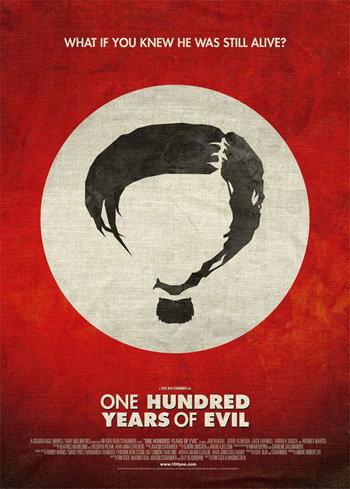
So here we are, finally in Cannes. Tomorrow we screen our film, our labor of love that doesn’t have more than a title and three very broke filmmakers attached to it. We stay home and cook noodles in our basement apartment which probably is the cheapest you can rent in Cannes. Once again we all go to sleep in the same room. After a few hours Joacim wakes up and screams. We’re not alone in here. We are being robbed by five guys taking everything of value. Computers, passports, wallets…and the screening copy of our film. As Joacim roars the thieves rush out. It’s game over. We’ve lost everything. We have to cancel the screening. Actor Jon Rekdal can’t take it anymore and disappears out of the door into the night. When the police arrive they can only confirm that everything is gone. We’re about as low as we could go. As the officers leave one of them stops outside on the pavement and picks something up. ”And this, is this yours?”He holds up the HD-cam tape with the screener of our film. PHEW.
The screening is a success. It leads to more festivals, to sales agent Ravenbanner and finally to distribution company FilmBuff. And one hundred months later, this Saturday May 19, we will have a New York theatrical premiere at indieScreen in Williamsburg!
Was it all worth it? Yes.
Would we do it again? No.
-Erik Eger, Magnus Oliv, Joacim Starander
100 Years of Evil is currently available on Movies on Demand and iTunes and will screen at indieScreen (289 Kent Ave., Brooklyn) for one week only beginning May 19.
BIO (From FilmBuff.com):
Today (FilmBuff) we happily present a Guest Collection from the filmmakers behind 100 Years Of Evil: Erik Eger, Magnus Oliv and Joacim Starander. These Swedes are a diverse team and they often take on various roles on their film projects. Whether it’s directing or writing each also takes on a small acting role in 100 Years of Evil. Eger has previously directed God Willing and worked with Starander on the short film The Artist. Together these three have collaborated on a diverse collection that shows the films that inspired their Hitler mockumentary.
Filmmaker Jeff Myers (from FilmBuff’s BECOMING SANTA) talks FORBES & the current state of Theatrical Distribution with Karen Worden outside the Film Courage studio.






















